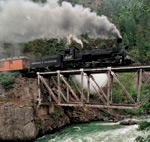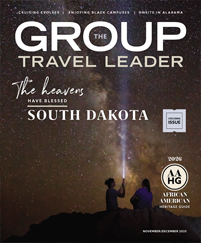Group travel leaders these days have a lot to think about: A weak economy, changing demographics, fluctuating costs of travel and the ever-fickle tastes of their travelers are at the top of the list. For people who make a hobby or a career out of taking their friends on vacation, all of this change can create a lot of questions.
Fortunately, group leaders are finding answers, and these answers are as individual as they are and the collective personalities of the constituents they serve. For some, it’s an increase in day trips; for others, big-ticket journeys to international destinations are the top sellers.
Some group leaders are thinking creatively and experimenting with new trips to excite their travelers. Others are going back to the standby destinations that have been perennial favorites. But whatever they are doing to keep their travel programs strong, these leaders are making sure to tailor their strategies to the tastes and budgets of their travelers.
We spoke with five group leaders across the country to find out what groups want in travel today and what strategies they are deploying to stay active and successful in 2010. The answers paint a picture of the diversity of the group travel market throughout the United States.
Appalachian Bankshares Prime Travelers
Ellijay, Ga.
Like so many people around the country, members of the Appalachian Bankshares Prime Travelers club saw their investment income dwindle to almost nothing late last year. Sam Burrell, who manages the multibranch travel program, says that diminishing returns made his members think twice about more expensive trips.
“These are people who have been traveling on the interest that they made on their CDs and investments,” Burrell said. “Well, they’re not getting that right now. And so I’m not getting as many overseas travelers as I normally do. Alaska didn’t sell that well, Kenya isn’t selling, China didn’t sell, and London-Paris didn’t sell.”
The high price tags of trips to exotic destinations may have deterred bank customers with less disposable income of late. But they haven’t hampered the bank customers’ taste for travel altogether — traditionally strong domestic destinations were still popular for Burrell’s group this year.
“My Branson and day trips are doing really well right now,” he said. “We’ve done Montana and the trains of Colorado, and they’ve sold extremely well.”
So to keep his customers traveling, Burrell has been planning more day trips and more trips that require a single overnight. Favorites include trips to a mystery dinner theater in Atlanta and the Tennessee Aquarium in Chattanooga.
Burrell is also keeping enthusiasm high about traveling by holding monthly club meetings, where members have dinner together, share photos from their previous trips and discuss upcoming travel opportunities.
 |
| Colorado train trips such as the Durango and Silverton Railroad have sold well for Sam Burrell of Appalachian Bankshares Prime Travelers. Courtesy Durango and Silverton Railroad |
And when he’s planning a trip, Burrell adds extra touches that customers wouldn’t get if they booked trips themselves online.
“I start adding little things that don’t cost much,” he said. “In Amish country, we go and visit a furniture factory to see how they operate without electricity. It doesn’t cost me anything, because we take them to the showroom, where they can shop.”
For 2010, the club is going back to old standbys, such as the Canadian Rockies, Napa Valley and a Panama Canal cruise. And when the economy does begin to recover — in about six more months, Burrell estimates — customers will be ready to take bigger trips.
“You don’t want to put your savings and security in danger,” he said. “But once the upswing comes and you get more from your investments, those people will want to start traveling again.”
Lone Star Travelers
Cameron, S.C.
When bad economic news started to break last year, Kristi Shirer went to her Lone Star Travelers group to see what their feelings were about traveling. The response was surprisingly positive.
“They have been asking for several years now to do a Grand Canyon trip,” Shirer said. “I sent out a questionnaire asking them if they still wanted to do that trip, and they said yes. So I went ahead and planned a two-week trip based on 30 people, and I had 34 sign up for it immediately.
“I was shocked, because it’s a very expensive trip. But I have a very loyal group, and it’s something they had asked for. I don’t think the price had made a difference to them.”
One advantage that Shirer’s group has is geographic: In Cameron, S.C., the local economy has been spared some of the greater economic damage that has hit larger cities. About 60 percent of the Lone Star Travelers work in agriculture and, as Shirer said, “people have to eat.”
She also believes that the age and affinity of her travelers makes them more likely to keep traveling together.
“I’m 53, and our group is all around that age,” she said. “Our trip is like a big family reunion. It’s friends, and it’s friends of friends. They’re very selective about who comes, because they’re going to spend a week or two weeks on the bus with these people.”
For next year, the group is planning two trips — a seven-day visit to North Carolina’s Outer Banks and a nine-day trip to Indiana’s Amish Country. Though the group has taken as many as six trips in previous years, Shirer plans to start with the initial offering of the two trips and then see what happens.
“I’ve never had to cancel a trip because I didn’t get my numbers,” she said. “But I did do fewer trips this year. So for next year, I’m going to throw those trips out there for them and then let them decide if they want to do more.”
Ypsilanti Township Recreation Department
Ypsilanti, Mich.
It’s no secret that Michigan has seen a difficult couple of years as the Big Three automakers in Detroit have fought for survival amid declining sales. The economic ripple effect has changed how Debbie Aue of the Ypsilanti Township Recreation Department near Ann Arbor has planned group travel.
“Michigan is pretty tough right now, and we’re just starting to really feel it here,” she said. “A lot of our members are retired from General Motors or other auto suppliers. But our numbers have actually grown quite a bit in the last two years. I think it’s because people are looking for someplace to congregate where they can have fun, but not have to pay an arm and a leg for it.”
As a result, Aue is looking for overnight trips that are lower in cost and focusing on “all-inclusive”-style trips where travelers get more for their money. She’s also working harder to try to combine trips with other groups in order to save money.
“Anything we book now, we try to go with another group,” she said. “If we go with a tour operator that’s offering a packaged trip, we request that they put someone else with us, because we’re finding it difficult to fill the bus.”
This year, the group took a trip to Alaska and did an overnight gaming trip to Bay City, Mich. For 2010, Aue is planning a trip to the Canadian Rockies and looking for another cruise destination.
She’s also on the lookout for shorter, less expensive trips that appeal to younger travelers.
“We’ve got to be careful what we offer,” she said. “We need to start offering more adventurous types of travel that would appeal to a younger senior or a working senior, things like less expensive cruises that include more adventure and more walking.”
Tours with Faye
Columbia, S.C.
Faye Brown leads a variety of groups, including her church, a community center and several retirement centers in the Columbia, S.C., area. Although 2007 was a great year for her travel groups, she found business falling off in 2008 and 2009. So she decided to mix things up.
“I put together groups to visit small towns throughout the state and discover treasures that are in our back yard,” she said. “It’s been really good for the small communities, and it’s been very educational for the groups.”
Brown said that the “sweet spot” for her tours right now seems to be two to three days, with destinations less than 300 miles away from home. And to drum up interest in longer tours, she encourages group leaders to “get creative” in promoting their tours.
 |
| A group from the Ypsilanti Township Recreation Department in Michigan took a trip to Alaska this year, but leader Debbie Aue is on the lookout for shorter, less expensive trips. Photo by Brian Jewell |
“I have a travel fair where I share about trips that are coming for the year ahead. I also do passport parties or have dress-up characters come from storytelling destinations.”
She expects 2010 to be a rebound year and is planning a trip to the Canadian Rockies, which is almost sold out. There may be an Alaskan cruise in the works or a return to Europe, which she expects to become more affordable for Americans next year.
But regardless of the destination, Brown has one piece of advice she believes is critical for group leaders.
“Group leaders have to get back to basics: knowing your audience and where they want to go, and paying special attention to the details,” she said. “I try to remember the golden rule: If you treat your travelers the way you would want to be treated, they’ll go anywhere in the world with you.”
Premier Bank PALS
Jefferson City, Mo.
In Missouri, the Premier Bank PALS travel program has been having a good year. PALS director Janie Hedglin said that her biggest trips all had very strong numbers.
“I took 67 people to Mexico, and took 43 to Spain and the Canary Islands,” she said. “My extended trips have been bigger, and oddly so. Sixty-seven to Mexico was almost twice as many as I usually take.”
Demand for the international trips has even outstripped interest in day trips and shorter domestic vacations. Only 30 people took a trip offered to Mackinac Island this year, and so far only 33 have signed up for a trip to New York City.
Hedglin said although they expressed concern about taking expensive trips in today’s economy, customers aren’t necessarily buying into shorter trips.
“This spring, when they started seeing the prices of some of our trips, they said, ‘We want shorter trips that are less expensive.’ So I made those happen, and then they didn’t sign up for them. But all of my big extended trips are selling out.”
Hedglin credits much of her program’s success to her close work with a preferred tour operator who she says helps develop trips to exciting destinations her travelers consistently find attractive.
Early in 2010, Hedglin’s group is visiting Yellowstone National Park and taking a 12-day Caribbean cruise. Later on, they’ll visit Washington state; Wisconsin; Boston; San Antonio, Texas; and Southern California to see the Rose Parade. Once the current swine flu panic passes, Hedglin says she expects that 2011 will bring a return to Mexico, which has always been a favorite destination for her groups.
And she believes that fun and enthusiasm will continue to attract bank travelers, regardless of the economy’s struggles.
“The whole premise of our program revolves around fun and excitement and enthusiasm,” she said. “There’s a great deal of enthusiasm and community spirit. These people want to get away from their recliners and TVs.”










